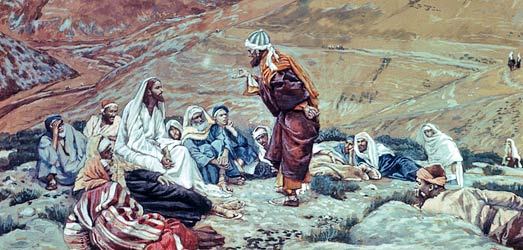
The Parable of the Unforgiving Servant
22 Jesus said to him, “I do not say to you, up to seven times, but up to seventy times seven. 23 Therefore the kingdom of heaven is like a certain king who wanted to settle accounts with his servants. 24 And when he had begun to settle accounts, one was brought to him who owed him ten thousand talents. 25 But as he was not able to pay, his master commanded that he be sold, with his wife and children and all that he had, and that payment be made. 26 The servant therefore fell down before him, saying, ‘Master, have patience with me, and I will pay you all.’ 27 Then the master of that servant was moved with compassion, released him, and forgave him the debt. . . . –Matthew 18
Part One (link) sought to show how our American minds can be derailed by details: “How do we account for this huge debt?” But the “shock and awe” of 10,000 Talents in Jesus’ day serves to grab the attention of Jesus’ listeners.
If we stay on track with this parable, we come to the clear lesson at the end: “We are in no position to repay our debt to God or to ever be able to work off that debt. We can only beg for mercy. And in the face of our outlandish debt which has been forgiven, it is equally outlandish that we servants should spurn God’s mercy by demanding the full payment of a pittance owed to us by any fellow servants as we close our ears to their pleas for forgiveness.”*
In our day when self-centered therapeutic forgiveness bumps Christ-centered Biblical forgiveness off of the tracks, we need to clearly look at the context.
Leading up to this parable, Jesus teaches about sin and forgiveness. Verse 15, “If your brother sins against you,go and tell him his fault, between you and him alone. If he listens to you, you have gained your brother…”
This prompts Peter’s question in verse 21, ‘Then Peter came to Him and said, “Lord, how often shall my brother sin against me, and I forgive him? Up to seven times?”’
Which leads into this parable of the unforgiving servant.
A parallel teaching in Luke 17 brings clarity to what we, in our day, often miss about Jesus’ instruction:
Verse 3f, “So watch what you do!If your brother sins, rebuke him, and if he repents, forgive him. 4 If he sins against you seven times in one day, and each time he comes to you saying, ‘I repent,’ you must forgive him.”
It is this plea for mercy, the repentance, that is often left out of this picture by confused Christians in our depraved world. As Jesus clearly teaches, repentance precedes forgiveness, both ours before God, and our brother’s before us.
And whether seven times or seventy times, the forgiveness is unlimited, BUT not unconditional. Jesus: “…if he repents.” (If he does not, we are commanded to take additional steps to regain our brother.)
Also, take note that Jesus is teaching about relationships between ‘brothers,’ between fellow Christians. When it comes to enemies, Jesus never says anything about forgiveness. He says to love them. And that love may lead to their repentance.
This topic of forgiveness has become more confused among many Christians than today’s confusion about love.

We need Christian disciples (i.e. learners) who will go back to the Bible and be taught the basics, and then disciple others. For a fuller discussion of this topic which focuses on the Text and draws on the best of key evangelical resources, see “Forgiveness and Repentance,” Chapter Three of: 
(link to reviews, details, kindle, nook, etc., ebook $3) “…an excellent piece…one that many Christians need to hear”–R.C. Sproul
Here is a Sermon on the text by R. C. Sproul. He sets the example for preaching in context. (It was a letter from R. C. Sproul that encouraged me to expand on the theme of love becoming heresy which prompted the writing of this book.)


